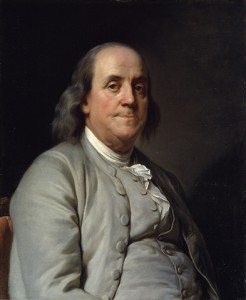“Slavery is such an atrocious debasement of human nature, that its very extirpation, if not performed with solicitous care, may sometimes open a source of serious evils…”
“Accustomed to move like a mere machine, by the will of a master, reflection is suspended; he has not the power of choice; and reason and conscience have but little influence over his conduct, because he is chiefly governed by the passion of fear.”
(Full text below.)
Benjamin Franklin’s Address to the Public
November 9, 1789
“It is with peculiar satisfaction we assure the friends of humanity, that, in prosecuting the design of our association, our endeavors have proved successful, far beyond our most sanguine expectations. Encouraged by this success, and by the daily progress of that luminous and benign spirit of liberty, which is diffusing itself throughout the world, and humbly hoping for the continuance of the divine blessing on our labors, we have ventured to make an important addition to our original plan, and do therefore earnestly solicit the support and assistance of all who can feel the tender emotions of sympathy and compassion, or relish the exalted pleasure of beneficence.
Slavery is such an atrocious debasement of human nature, that its very extirpation, if not performed with solicitous care, may sometimes open a source of serious evils. The unhappy man, who has long been treated as a brute animal, too frequently sinks beneath the common standard of the human species. The galling chains, that bind his body, do also fetter his intellectual faculties, and impair the social affections of his heart. Accustomed to move like a mere machine, by the will of a master, reflection is suspended; he has not the power of choice; and reason and conscience have but little influence over his conduct, because he is chiefly governed by the passion of fear. He is poor and friendless; perhaps worn out by extreme labor, age, and disease.
Under such circumstances, freedom may often prove a misfortune to himself, and prejudicial to society.
 Attention to emancipated black people, it is therefore to be hoped, will become a branch of our national policy; but, as far as we contribute to promote this emancipation, so far that attention is evidently a serious duty incumbent on us, and which we mean to discharge to the best of our judgment and abilities.
Attention to emancipated black people, it is therefore to be hoped, will become a branch of our national policy; but, as far as we contribute to promote this emancipation, so far that attention is evidently a serious duty incumbent on us, and which we mean to discharge to the best of our judgment and abilities.
To instruct, to advise, to qualify those, who have been restored to freedom, for the exercise and enjoyment of civil liberty, to promote in them habits of industry, to furnish them with employments suited to their age, sex, talents, and other circumstances, and to procure their children an education calculated for their future situation in life; these are the great outlines of the annexed plan, which we have adopted, and which we conceive will essentially promote the public good, and the happiness of these our hitherto too much neglected fellow-creatures.
A plan so extensive cannot be carried into execution without considerable pecuniary resources, beyond the present ordinary funds of the Society. We hope much from the generosity of enlightened and benevolent freemen, and will gratefully receive any donations or subscriptions for this purpose, which may be made to our Treasurer, James Starr, or to James Pemberton, chairman of out committee of correspondence.
Singned by order of the Society,
B. Franklin, President”
Source: History of the Negro Race in America from 1619 to 1880
Comment |

 Share on Facebook
Share on Facebook
 Tweet
Tweet
 Add My Story
Add My Story






